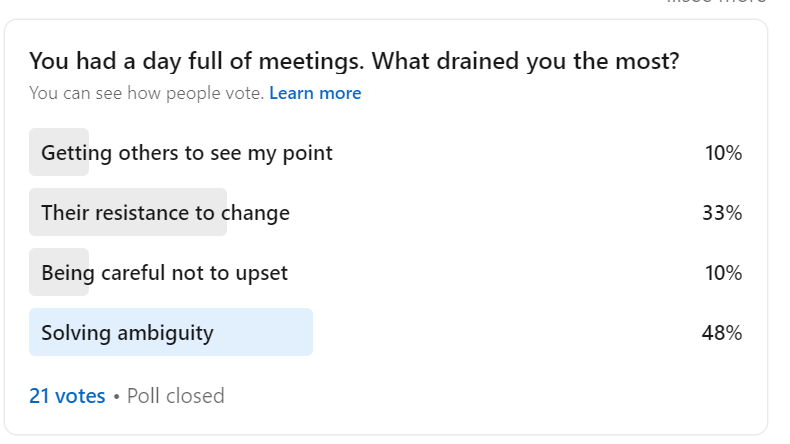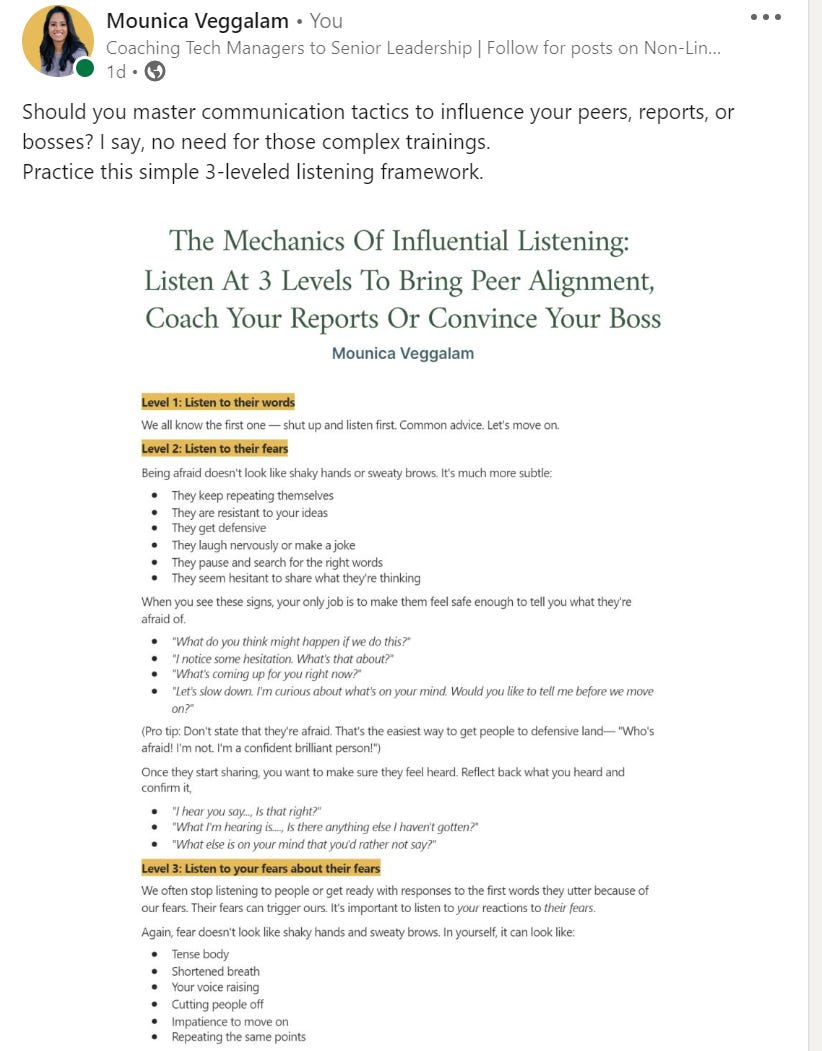The Best Way To Handle Pushback Without Needing To Memorize Communication Tactics— Become A Resistance Detector
Communication tactics have a half-life at best.
There is a different way of thinking to become more influential in your conversations, handle pushback with grace and avoid you being drained like a squeezed-out dish rag at the end of a day full of meetings. We’ll dive into that new way in this post.
I recently ran a poll on what causes meeting fatigue and got interesting results:
The 33% of people who answered "Their resistance to change" were managers.
The other 48% who answered "Solving ambiguity" were ICs.
You would think your meeting fatigue is because of the sheer number of meetings on your calendar. Although that might be true, the bigger reason for your fatigue as a leader, is aligning people and handling pushback.
The polls confirms the strong hunch I had from talking to clients, and my experience coaching people. Is that your experience as well? Could you reply to this email and tell me?
So, how do you handle pushback without mental fatigue?
There are 2 types of systems working in you.
If you've read Danial Kahneman's Thinking fast and slow, you might be familiar with the 2 systems of thinking:
Fast thinking (processing non-verbal information and making decisions quickly)
Slow thinking (conscious decision-making and self-control).
(Btw, kudos to you if you finished reading this book. I dozed off whenever I picked it up.)
I have a similar theory to explain the mental fatigue from pushback. I keep returning to this theory after observing my clients. I see it everywhere— my coach training, conversations with my coach, and even the eastern spiritual wisdom.
So, there are 2 systems in you:
The creative, intellectual, logical self
The survival system that keeps you alive.
Most people think they're operating from the 1st system the logical, creative and intellectual. At least at work, right?
But the kicker is that we're operating from our survival system more than we think. No matter how brilliant we are. No matter how evolved we are. No matter how much awareness, therapy, and coaching we got.
Almost all the time, our responses in any conversation come from the 2nd system— our survival system.
The survival system puts up resistance in a sneaky way.
Your ideas to solve a problem follow from your worldview, your experience, your intellect, and your creativity— the system 1.
But once the idea is formed, your survival system takes over. It wants to get your idea executed at all costs.
Your success depends on the acceptance of this idea.
Your self-worth depends on the acceptance of this idea.
Your acceptance in the world depends on the acceptance of this idea.
It becomes personal.
The survival system creates resistance to keep you in the zone of uniqueness, worthiness, and acceptance.
Here's the secret we don't want to admit: Often, we think we're responding to logical arguments. But we're actually arguing from our resistance against their resistance.
Pause and Read that again.
This is true even when you intend to be collaborative and open to other ideas when dealing with uncertainty. This resistance will take over if those other ideas don't uphold your worldview.
We know this somewhere and want to get over these primitive urges of anger, fear, and shame. This constant fight between the 2 systems takes up so much mental energy.
And imagine as a leader, you have to fight your own survival system and lead others to fight theirs through conversations that influence, inspire and execute your vision.
Double drain.
Is there a way out?
Short Answer: Yes. Become a Resistance Detector.
Long Answer:
Don't just focus on the words. Focus on the resistance waves behind the words.
Yours and theirs.
Know that the survival systems have kicked up when:
there is slight frustration or agitation.
they pause and search for the right words.
they're hesitant to share what they're thinking.
there is nervous laughter and a tendency to make jokes.
you feel a craving to repeat your point in different ways.
the other person is going in circles repeating what they said.
Stop all your efforts to drive your point home, and make space for the resistance to exist.
There is nothing wrong with anyone when resistance shows up. It's how we're wired.
Your influence starts when you bring this understanding and make space for the resistance in your conversation container.
It sounds simple and easy to write in an article but tough to execute.
Start with this practice:
Practice "tasting" resistance like you would taste a strawberry.
In any conversation going forward, your job is not to
Make them listen to you
Stop their resistance or pushback
Get the sign-off or get a 'Yes' from them
Your only job is to detect resistance and make space for it.
Be fascinated by the different unique ways resistance shows up. Said another way, put on your Sherlock Holmes hat and detect the resistance. When you detect it, taste it like you would taste a strawberry.
What does it taste like?
Does your breath change? Has it gone hot or cold? Is your belly contracted? Are your hands folded? Is it your resistance you're sensing or theirs? What's the tone of their voice? If the air between you had a taste, what would it taste like?
When you do this, you develop a capacity to handle two conflicting survival systems in your conversation container. People open up and share their true concerns, and you can start solving real problems.
I have more tactical tips here in this LinkedIn Post.
I've come to the conclusion that the best executive coaches have become master Resistance Detectors. That's a big part of how they cause massive transformation in the most hardened behavior patterns (and can sell coaching packages costing upwards of $70k USD).





